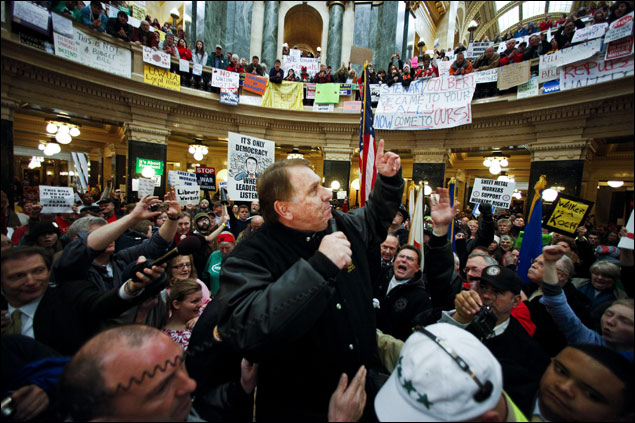Union fights may land in court
By: Jack Zemlicka, [email protected]//February 23, 2011//

Courtrooms could be the next battlefields if unions lose their collective bargaining rights and struggle to collect dues under existing contracts.
“We get questions from membership as to, ‘Why would I continue to pay voluntarily?'” said Lyle Balistreri, president of the Milwaukee Building and Construction Trades Council. “How many people pay voluntarily to do anything?”
The collective bargaining bill stalled in the Wisconsin Legislature can modify state statutes, said Madison attorney Lester A. Pines, but lawsuits could pop up over whether abolition of bargaining rights supersedes the ability of union employers to withhold dues under existing contracts.
“I think there is serious question as to whether the Legislature can impair a contract like that,” said Pines, of Cullen Weston Pines & Bach LLP, and counsel for Madison Teachers Inc. “Will school districts or municipalities legally be able to withhold union dues?”
They will, said Lance M. Nelson, staff representative for the American Federation of State, County and Municipal Employees Council 40 in Chippewa Falls, but unions will struggle to enforce the fair dues structure because of the increased health insurance and pension contributions employees would make under the proposed legislation.
“Would the contract remain valid? Sure,” Nelson said. “But with people paying so much more, after you get done taking a big hit, nobody is going to have the money to afford to pay dues.”
Gov. Scott Walker’s proposal would force public workers to contribute about five percent to their pensions and at least 12.6 percent to their health care coverage.
The governor’s plan would let unions representing most public employees to negotiate only for wage increases, and any increase above the Consumer Price Index would have to be approved in a statewide referendum.
Unions also would face a membership vote every year to stay organized, and workers could opt out of paying dues.
All of these factors could greatly diminish unions’ power, Balistreri said. Without collective bargaining rights, he said, unions likely would be tied up fighting grievances related to the enforceability of existing contracts.
Unions are trying to work with Walker to retain their collective bargaining rights in some form, but no progress has been made.
Under one proposal, union leaders said they would accept paying more for benefits as Walker wants but still retain their collective bargaining rights. Another compromise offered by Republican Sen. Dale Schultz would remove collective bargaining rights for just two years.
Walker has repeatedly rejected both offers, saying local governments and school districts can’t be hamstrung by the often lengthy collective bargaining process and need to have more flexibility to deal with as much as $1 billion in cuts he will propose in his budget and into the future.
If the legislation does pass, Nelson said, he expects there will be legal challenges to the constitutionality of the law, among other things.
“But we have no ideas,” he said, “as to where it will focus at this point.”
The Associated Press also contributed to this story.
Legal News
- State Bar leaders remain deeply divided over special purpose trust
- Former Wisconsin college chancellor fired over porn career is fighting to keep his faculty post
- Pecker says he pledged to be Trump campaign’s ‘eyes and ears’ during 2016 race
- A conservative quest to limit diversity programs gains momentum in states
- Wisconsin prison inmate pleads not guilty to killing cellmate
- Waukesha man sentenced to 30 years for Sex Trafficking
- 12-year-old shot in Milwaukee Wednesday with ‘serious injuries’
- Milwaukee man convicted of laundering proceeds of business email compromise fraud schemes
- Giuliani, Meadows among 18 indicted in Arizona fake electors case
- Some State Bar diversity participants walk away from program
- Wisconsin court issues arrest warrant ‘in error’ for Minocqua Brewing owner
- Iranian nationals charged cyber campaign targeting U.S. Companies
WLJ People
- Power 30 Personal Injury Attorneys – Russell Nicolet
- Power 30 Personal Injury Attorneys – Benjamin Nicolet
- Power 30 Personal Injury Attorneys – Dustin T. Woehl
- Power 30 Personal Injury Attorneys – Katherine Metzger
- Power 30 Personal Injury Attorneys – Joseph Ryan
- Power 30 Personal Injury Attorneys – James M. Ryan
- Power 30 Personal Injury Attorneys – Dana Wachs
- Power 30 Personal Injury Attorneys – Mark L. Thomsen
- Power 30 Personal Injury Attorneys – Matthew Lein
- Power 30 Personal Injury Attorneys – Jeffrey A. Pitman
- Power 30 Personal Injury Attorneys – William Pemberton
- Power 30 Personal Injury Attorneys – Howard S. Sicula











